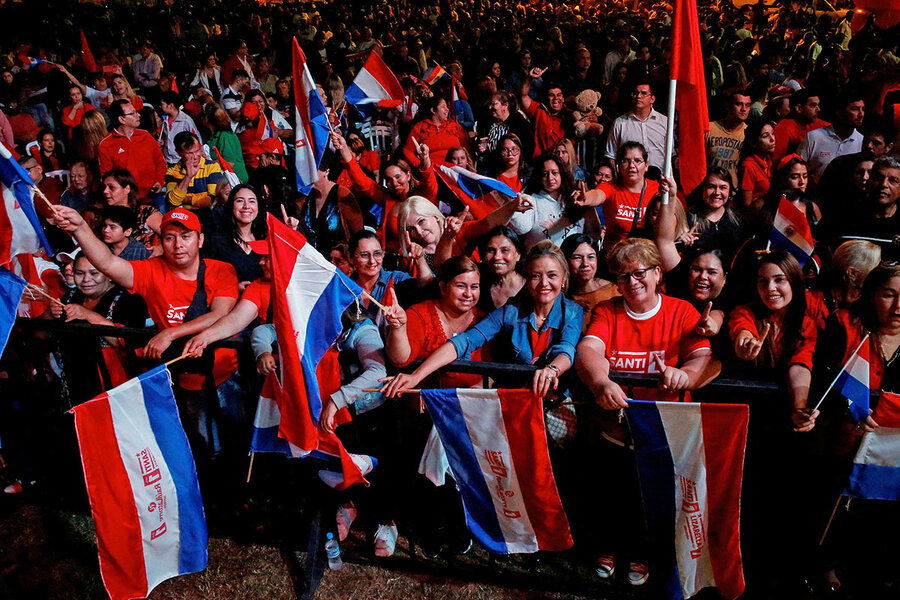Today, after 61 years of continual rule by the Colorado Party, there is widespread uncertainty in Paraguay. The potential for change has characterized the general election from its outset, where the opposition, for the first time in decades, has a leading advantage. In contrast to former elections, people today are actually wondering whether a non-Colorado candidate will be allowed to win in what has become known as an enduring corrupt mechanism that consistently votes for itself. Since the fall of Paraguay’s dictatorship in 1989, the electoral outcome has been predetermined towards the Colorados. But April 20, 2008 may go down as a transcendent date in Paraguayan history: the beginning of a democratic transition after five maneuvered elections that favored “big fish” politicians and treated citizens as easily manipulated marionettes. Meal handouts have bought votes in the past, but Paraguayans are tired of empty promises. Under Nicanor Duarte Fruto’s current presidency the number of Paraguayans living in poverty has increased from 1.2 million to over 2 million, making up 36 percent of the total population. Anxiety and hope have accompanied this real possibility for change: if the opposition wins, traditional incumbents will lose their influence in the existing patronage system. The Patriotic Alliance for Change, a multiparty coalition with the support of Federico Franco’s Authentic Radical Liberal Party, is the main challenger to the traditional Colorado Party. Fernando Lugo, a former Roman Catholic Bishop and the Patriotic Alliance for Change’s presidential candidate, is expected to win. However, Lugo has suffered from a strategically crafted negative propaganda campaign against him that labels him as a socialist heretic and close ally of Hugo Chávez. This stigma has been addressed on numerous occasions by supporters who have reassured the public of their staunch belief in property rights and proper land distribution. As evidence of Lugo’s moderate stance, his supporters have chosen Dionisio Borda, a renowned neoliberal economist, as his Finance Minister. In terms of international policy, Lugo has announced he will increase the cost of hydroelectric energy that Paraguay sells to Brazil by 500 percent in order to reach a “fair price,” a provision left ambiguous in a contract that was signed during dictatorship regimes in both countries that left Paraguay at a notorious disadvantage. Lugo’s direct competition is the Colorado Party’s first female candidate. Blanca Ovelar was Minister of Education under Duarte Frutos and is now running as a self-proclaimed puppet of the president, who himself is at the top of Senate elections. Ovelar became the Colorado candidate last December through a fraudulent primary election process in which she beat Vice President Luís Castiglioni of Vanguardia Colorada by approximately 4,000 votes (366,722 to 362,702). Consequently, some Castiglioni followers have withdrawn their support for Ovelar, creating a partition in the Colorado party. This internal divide and weakening of the Colorados is a first-time occurrence in Paraguay’s history, reflecting a nascent desire by Vanguardia advocates to reform the party. Vanguardia’s loss also demonstrates that the Paraguayan democratic system is still undermined by a fraudulent Supreme Electoral Court, which is able to generate results from the top without a check on its power. Lino Oviedo, an ex-army general and former Colorado, is the third significant contender in today’s election under his newly created party UNACE. Oviedo, a populist leader, served a double prison sentence for his participation in the 1996 attempted coup d’ état against President Juan Carlos Wasmosy and for his involvement in the killing of young protesters at the “Marzo Paraguayo.” Last year, he was found innocent by the new Supreme Court that annulled his sentence and opened the road to his candidacy. The Supreme Court’s decision is widely viewed as an ingenious tactic by President Duarte Frutos to divide the opposition and strengthen the Ovelar-Santacruz ticket. What will a change in administration look like? There is a lot of speculation around this issue. Some believe Lugo will be able to follow President Lula’s successful example in Latin America, but only if he is able to balance different interests among members of the alliance and the Colorados. Lugo will need to be a pragmatic in order to govern, or else a stalemate may hinder many, if not all, of his national agenda projects. In the worst case scenario, Lugo’s presidency could result in chaos, given that many of his policies may be blocked by opponents in municipalities and Congress. Either way, Paraguayans are ready for an end to more than half a century of kleptocratic one-party rule. If today’s elections acknowledge Lugo’s victory, more important than the policy advances during his presidency will be the fact that Paraguayans will be writing their own history, prioritizing the birth of citizenship and democracy.
Elections in Paraguay: Hope and Fear of Change

By
Posted in
Reply